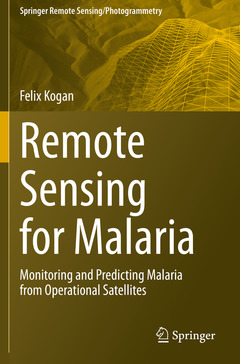Remote Sensing for Malaria, 1st ed. 2020 Monitoring and Predicting Malaria from Operational Satellites Springer Remote Sensing/Photogrammetry Series
Auteur : Kogan Felix

This book presents research using high-resolution operational satellite data for monitoring and assessing numerically how to reduce the area and intensity of malaria outbreaks. Satellite data and imageries a powerful and effective tool for malaria monitoring and reduction of the number of affected people as it bypasses the limitations imposed by the dearth of near-the-ground weather data in many malaria-prone areas. With this in mind, this volume provides readers with:
In-depth information in monitoring signs of malaria from operational polar-orbiting satellites
Examples of country-specific models for predicting malaria area (1 and 4 km2 resolution) and intensity
Information on the how the effects of climate change on malaria outbreak area and intensity can be monitored
A new Vegetation Health (VH) methodology to estimate vegetation moisture, temperature and moisture/temperature conditions as indicators of malaria vector activity
Advice to users on the application of VH technology for early assessments of malaria area, intensity and risk level
Remote Sensing for Malaria is intended for an audience of public health practitioners, environmentalists, and students and researchers working in spatial epidemiology and disease prevention.
Discusses how to monitor malaria from operational polar-orbiting satellites
Applies a new Vegetation Health (VH) methodology to assess indicators of malaria vector activity
Provides VH technology to users for early assessments of malaria area, intensity and risk level
Date de parution : 07-2021
Ouvrage de 286 p.
15.5x23.5 cm
Disponible chez l'éditeur (délai d'approvisionnement : 15 jours).
Prix indicatif 105,49 €
Ajouter au panierDate de parution : 07-2020
Ouvrage de 286 p.
15.5x23.5 cm
Disponible chez l'éditeur (délai d'approvisionnement : 15 jours).
Prix indicatif 105,49 €
Ajouter au panier


